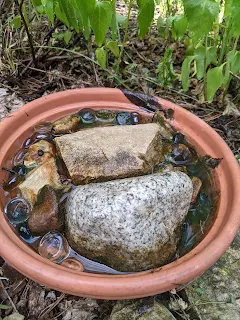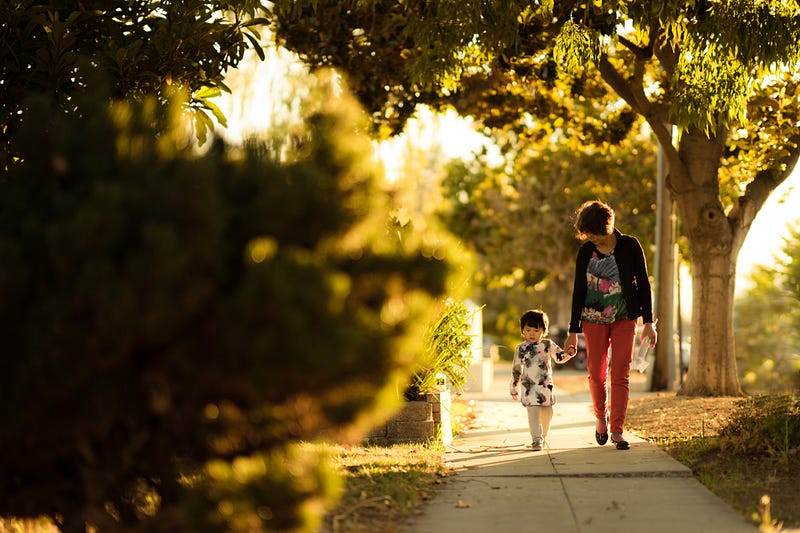C.S. Sherin
11 June 2021
You know, it's really been hot out these days. I think we are on our 9th day of high heat and humidity today, with the hope that today or tomorrow afternoon will at least remove the high humidity, as forecasted. That's definitely not what I like about summer. But, the silver lining has been that everything is green again, including the vines on the window where I write...
 |
And, the humidity keeps me from being so restless as I get in the summer...restless to be outside as much as possible. With the heat as it has been, I have found that getting up in the wee hours to walk in the cooler air and hear the birds is such a joy. As is a stroll at night when the sunlight is gone.
The other night, though, our night stroll was still a bit limited by the humidity. What it felt like was this: being in an old stuffy attic where the air isn't circulating, and the heat hangs upon a person like a weight. We tried to ignore it and got a short walk in anyway.
So, the picture of where I write, where I am writing at this very minute, is a dream image to me. I love it! I can imagine showing this to the little girl in me, saying: "See, this is where you will write someday. And you will write things there that truly give you joy and energy!" Well, I can tell you, that little girl is happy to hear it. That little girl appreciates the hope, and the promise of a window nook to wake up and dream on.
What going through the pandemic and winter and short spring have done for me, is to hasten me towards activities that are at the core of me...at this time. One of those things is the daily dedication, hopes, dreams, and work of growing a garden. Again, with this comes the reality of oppressive levels of humidity and heat that require a gardener to double their efforts.
This isn't a big deal to anyone else, perhaps. But, for me, it is. I haven't made the effort to really garden since we moved to our current home nearly eight years ago. So, this is a breakthrough.
I planted: Roma tomatoes, kale (I would have preferred spinach, but couldn't find any), broccoli, strawberries, cilantro, basil, Greek oregano, calendula, lavender, cucumbers, lemon balm, catnip, ginger, spearmint, chamomile, geranium (an annual I've grown before), ashwaghanda (not a perennial), millet (also not a perennial), potatoes in a container, watermelon, and spaghetti squash. I already have chives, thyme, tarragon, mint, and very young rhubarb and blackberries.
It's been going great, but the heat is hard to beat. And, sadly, a baby squirrel has repeatedly gone into the garden bed to take out their frustrations about human beings, it seems. The squirrel didn't eat anything, simply tore the strawberry plants to shreds, till there is nothing but the roots left. And the same with a poor kale plant minding its business, and they killed the chamomile too, though it was struggling to begin with.
So, I got a small fence, and am looking for some netting. The strawberry plants were a gift, and I couldn't have been more upset about it last night. But, I know that (organic) gardeners and farmers go through many trials in order to enjoy harvests. Squirrels will be squirrels. I have to work around them, that's all. We still have plenty of kale, and, against the odds, I found organic strawberry plants at a local hardware store that were in desperate need of a home. So, I'll try again.
Every night, during this heat, I water the plants. For the watermelon and spaghetti squash I carry a big watering pot to the back yard. I stood in the dark last night, watering them, envisioning their juicy fruition someday, even though right now they are so young and small. It is a fitting task for an empty-nester, I suppose. But, more than that, being a romantic, I found that simple act of nurturing the plants that may feed us, if they survive, to be such a profound and beautiful one.
It is a great risk to grow things. There are so many challenges that may come. But, the dreaming, and the act of stewardship together are a neat marriage of heart and mind, logic and creativity. It's a worthwhile risk, and one often born of necessity. In uncertain times, the more we can grow (organic) food in our open spaces, the better.
When I water the garden at night, in these early days of summer, I am mindful of climate change and the environmental crises we face, and I am mindful of the severe drought in northern California right now... And, I am mindful that we are at near drought conditions here, where I am as well.
I would love to encourage you to find ways to connect to nature, and to take actions that can make a difference at this time--for your heart, mind, spirit, and for people, animals, insects, water, air, soil, and all. One small thing that can be done for pollinators and other wildlife is to provide fresh daily water for them to drink and bathe in.
And, if you are able to plant things, consider planting in ways that support not only yourself, but also pollinators. Plants, shrubs, and trees can provide shelter, nesting materials, food, seeds, berries, and pollen for many endangered species. It's worth considering. For example, instead of planting an ornamental shrub with no other use, why not look for one that provides shelter or food for wildlife in the winter?
And, of course, it's worth mentioning the importance and value of creating community gardens...especially in food deserts, where they are most needed. Such a simple act can be so life-saving and empowering for those in need. Our local YMCA is right on a main street of our city, and they turned their lawn into a free food forest for the community. So cool! That is something that so many places could do.
It truly is a delicately balanced tightrope we walk at this time. We are starting to recover from the pandemic, but things aren't normal. And, water, air and soil quality are major issues, along with so many other deeply pressing issues. It's overwhelming. But, I have found that if I focus on doing things I'm good at, and doing the things I love, that I have more life in me to deal with everything. I'm taking it one day at a time.
One day at a time, because it has been a rough 1.5 years. One day at a time, because then I can focus on the here and now...and that is the most effective and realistic place to operate from.
Gardening isn't easy, but it is good for me, in many ways. It's good exercise, good meditation, and a good source for food (if I am successful, and if the squirrel(s) can be stopped). It's hard to stay mad at the squirrel. I am annoyed, but I'm not going to hold a grudge. It's a waste of energy. Plus, we saw the two squirrels in the yard the other morning, and they are young. Jeff said, "They're just kids, aren't they?" As one sat to eat the pumpkin seeds we put out.
Very little in life seems to go as planned. And sometimes, things go very differently than planned, and also better than planned. I'm all for pleasant surprises at this point. That would quite nice!
Well, thanks for taking the time to stop by.
Until next time, take good care of you!
all my best,
Chandra
(C. S. Sherin)




